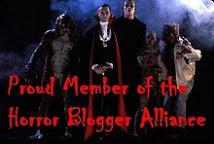The thing about Blacula that surprised even me is that it's a far better movie than you'd ever expect it to be. Focusing on the curse imposed on Prince Mamuwalde by the incredibly racist Dracula of the Eighteenth Century, it's a surprisingly gothic horror even when the setting moves to Los Angeles of 1972. (It's a shame we never got a Hammer Films/American International crossover featuring Dracula A.D. 1972 and Blacula, but that's a different story for a different day.) Marshall is a fabulous presence in the lead, playing the sophisticated kind of vampire audiences had come to expect, and the story takes a Shakespearean turn to focus on its romance as it moves along.
 While Marshall's imposing lead performance is the dynamite that makes Blacula explode, it's safe to say that the spark is provided by Vonetta McGee as both Mamuwalde's wife Luva and Blacula's muse Tina. McGee, seen above, plays the role of the confused modern woman well (Because who wouldn't be confused if a 200 year old prince turned vampire thought you were his deceased wife?), but most importantly adds a touch of mystery to her role. As the film progresses and she becomes more involved in Blacula's web of desire, the character evolves into a figure who's trapped between two conflicting worlds, and McGee offers up a subdued sensuality that shows off the inherent romanticism of Blacula's world, and it's through her performance that Blacula becomes more than just a cash in on the Blaxploitation era.
While Marshall's imposing lead performance is the dynamite that makes Blacula explode, it's safe to say that the spark is provided by Vonetta McGee as both Mamuwalde's wife Luva and Blacula's muse Tina. McGee, seen above, plays the role of the confused modern woman well (Because who wouldn't be confused if a 200 year old prince turned vampire thought you were his deceased wife?), but most importantly adds a touch of mystery to her role. As the film progresses and she becomes more involved in Blacula's web of desire, the character evolves into a figure who's trapped between two conflicting worlds, and McGee offers up a subdued sensuality that shows off the inherent romanticism of Blacula's world, and it's through her performance that Blacula becomes more than just a cash in on the Blaxploitation era.Speaking of cash ins, AIP immediately followed up Blacula with a sequel: Scream, Blacula, Scream. And the sole reason I wanted to seek out this sequel, aside from the promise of seeing Marshall reprise his role, was the fact that his object of desire this time is played by the one and only Pamela Grier.
 Grier is best known these days for starring in Quentin Tarantino's BEST film, Jackie Brown, but in the mid-'70s she was the queen of exploitation cinema. Running the show in films like Coffy and Foxy Brown, Grier made her name as the baddest mama to hit the screen, all while dating Kareem Abdul-Jabbar and being dubbed as the first woman action star. Unfortunately, Scream, Blacula, Scream predates her turn in Coffy and her action tenure, and her role as the voodoo child who Blacula thinks could help him is far more restrained than I'd hoped. It's a fine performance, but I think I might have been hoping for a little too much sass vs. class as she faced off against Mamuwalde.
Grier is best known these days for starring in Quentin Tarantino's BEST film, Jackie Brown, but in the mid-'70s she was the queen of exploitation cinema. Running the show in films like Coffy and Foxy Brown, Grier made her name as the baddest mama to hit the screen, all while dating Kareem Abdul-Jabbar and being dubbed as the first woman action star. Unfortunately, Scream, Blacula, Scream predates her turn in Coffy and her action tenure, and her role as the voodoo child who Blacula thinks could help him is far more restrained than I'd hoped. It's a fine performance, but I think I might have been hoping for a little too much sass vs. class as she faced off against Mamuwalde.Regardless, the work of Vonetta McGee and Pam Grier opposite Blacula, the Prince of Black Horror, is notable in the history of black women in horror. It would have been easy for AIP to turn the Blacula films into paint-by-numbers horrors full of the cliches that horror fans were accustomed to, but their willingness to focus on the romantic aspects of the lead character by pairing him up with two proud and independent women speaks volumes. As much as the idea of Blacula might make the casual onlooker gasp in disgust, I find it's a significant step in the right direction for the horror masses.










No comments:
Post a Comment